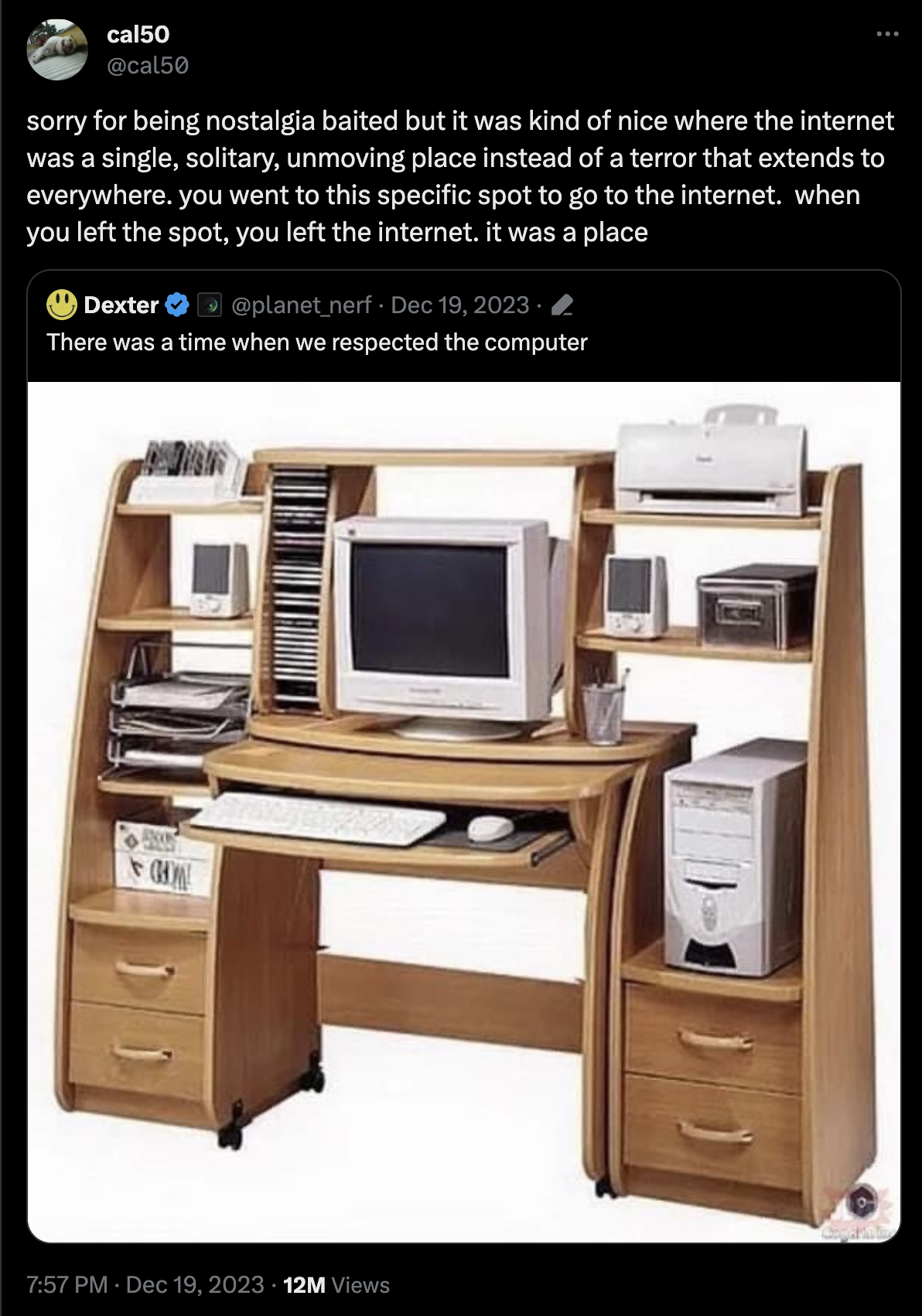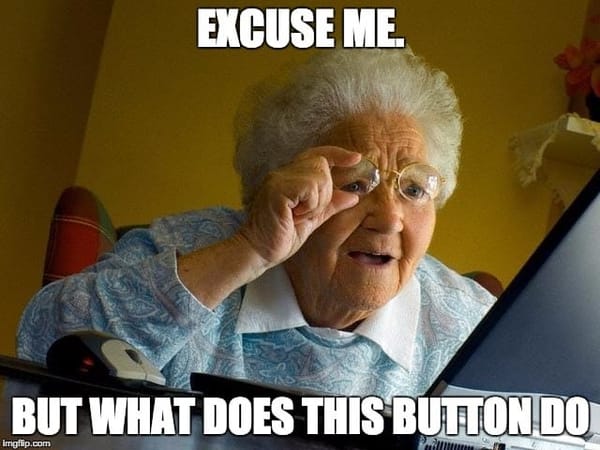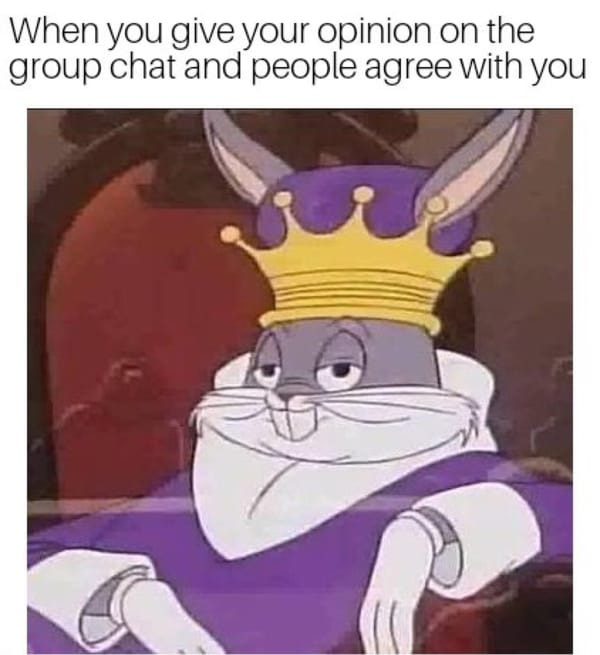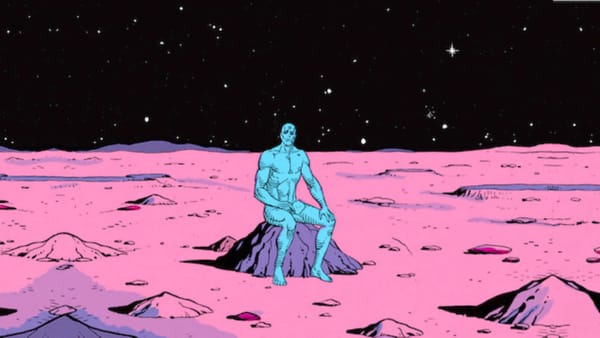"I Wonder What's On Tonight?"

Immersing yourself in something outside your corporeal reality is liberating. Life is hard, and we all deserve a break from the harsh, grating daylight of whatever currently ails our fragile minds, bodies, and souls. Escapist storytelling rituals have evolved alongside human society and ebbed and flowed with our collective identities, religion, politics, and culture. Like sex and warfare, fictionalized storytelling is a constant and unwavering part of us. Ancient tales told around blazing fires of grand golden deities performing legendary feats like lopping the heads off of foul demons or non-consensually canoodling with unlucky Earth-bound virgins; Multi-volume fantasy novels featuring little people with big hairy feet doing cross-country up the side of evil fiery mountains; Comic books featuring an alarming number of heroes who have special powers derived only from skintight spandex or daddy issues; Endlessly running TV shows about union workers stacking boxes on loading docks who are too busy to stop and speak with police detectives about horrific sexual crimes they may or may not have witnessed or committed. Wherever we are, whatever we do at any point in history, we innately seek and create entertainment.
A common refrain of concern trolls at every point on the political and cultural continuum is that society has become “atomized” - That we don’t share a commonality of objective truth, and our subjective truths are at odds with each other without room for compromise or empathy of perspective.
This is mostly true but also mostly false.
It’s objectively true that modern society is atomized on the political and cultural spectrum, although it’s admittedly sometimes hard to tell the difference between the “political” and “cultural.” But it’s objectively false to say that modern society is atomized at the pop-cultural level, at our base need and desire to tell and be told stories.
For the most part, we still consume mass entertainment together, even if we differ in our preferred means, modes, and methods of consumption. We are only human, and given the chance to be distracted from the drudgery of work, the stress of family, or the emptiness of our bank accounts, we will take it. We will not be found wanting for entertainment.
The Social Feeds in our device clutching hands; the 4K streams of reality TV piped into our living rooms; the theaters showing the latest dusty IP mined from the increasingly murky depths of our childhood nostalgia; the multiplayer games where you can enjoy teenagers chortling racial slurs at you as they virtually sack-tap your desiccated digital corpse. We have an endless river of capital-C Content to satiate our natural need to escape and lose ourselves in something other than -ANYTHING other than - our present circumstance.
For every monocultural and less popular semi-niche one-hour-long prestige TV show, the show itself is just the beginning. The storytelling does not stop at the screen. You can find hundreds, if not thousands, of equally one-hour-long episode recaps in the form of podcasts and YouTube videos (or, as I like to call them, “visual podcasts”) alongside thousands more SEO-ified formulaically written (and increasingly AI-written) episode analyses and innumerable Reddit threads postulating about what’s coming next and what easter eggs you may have missed.
These are unified common knowledge bases available to anyone and everyone who cares, and it seems that most people care a lot, given the number of “Was Paul Actually Bad?” articles that have populated my news aggregators in recent weeks. Entire ecosystems of knowledge, little-known facts, and explainers support fictional universes and their attendant history and politics.
But what has this abundance of information about our collective narrative fiction done to our non-fictional reality? For too many of us, our rightful and pre-historic need for the enjoyment of narrative mental escape from the toils of our everyday lives through entertainment has been completely subsumed by a historically unprecedented wealth of Content, sub-content, side-content, deep dives, group chats, Discords, DLC, fan-fiction, and spin-offs.
People watch a lot of stuff. And I mean a LOT of stuff. Like, over 21 hours on average per week, ‘a lot of stuff.’ Let’s talk about big-ticket TV, like Game of Thrones, 3 Body Problem, or popular ongoing reality TV series, Van Der Pump Rules, Survivor, or The Bachelor. These are entertainments that, in a vacuum, should be able to be enjoyed as such: in a vacuum. Watch the show, enjoy it, and move on with your life, having just taken a brief respite with - praise be - Glorious Content. But that is not how we now consume. We don’t just watch a one-hour show once a week for ten weeks once a year. We watch a one-hour show, listen to a one-hour podcast analysis, read three recaps, and try to be the first person to create a meme off of that thing that just happened in the most recent episode, and then talk about it at dinner with our friends and family, all of whom did the same. A one-hour show can quickly turn into four hours or more of actual time spent on that single one-hour episode.
We have replaced real institutional, historical, cultural, and political knowledge, along with arguably more specialized societal knowledge that we used to take for granted, with unreal institutions, histories, cultures, and politics of places we cannot visit because they don’t exist and people who we will never meet because they aren’t real.
This is not a new phenomenon, but it, like many other things in our hyper-consumptive, over-connected rot economy Hell of a 21st Century, has been amplified, magnified, and engorged to exponential degrees that individuals and society at large have had no way to prepare for, and which flies in the face of millennia of human brain development and accumulated cultural capital, decaying from the inside out.
As trust in institutions like government, the news media, and journalism generally reach all-time lows, the intellectual and socio-spiritual spaces those institutions previously occupied in our grey matter have been evicted, and their vacancies filled with pure Content insanity.
There are whole communities that thrive and flourish based on deep, intangible knowledge about things that will never tangibly impact their everyday lives. IP is big business, with the storied juggernauts of yesterday being regularly acquired, swallowed up, and merged into the gargantuan content machines of today for billions of dollars to have access to that precious IP gold - and to toxic fans that will spend their every waking hour screaming into ecstatic orgies of online toxic fan communities about how their favorite IP used to be better when it didn’t include women, black people, Muslims or cisgender white men. Oh, the shame.
Take the concept of a “Disney Adult,” which is as self-explanatory as it is absurd. While I enjoy a cartoon as much as the next person, probably more so, there are now people whose whole personalities and accumulation of knowledge capital relates to the fictional goings on of fictional Disney characters.
Can any Disney Adult tell me how many people live in the Gaza Strip? Can they point to Ukraine on a map? Can they explain what a Uyghur is? Or who the current Speaker of the House of Representatives is? Maybe they can, maybe they can’t, but they can assuredly tell me about the latest ride at Disney World, the best place in the park to get a Dole Whip, or how Minnie and Mickey fuck without genitalia.
What does it mean that until roughly 20-30 years ago, access to such a wide swath of objectively worthless, if not entertaining, knowledge could only be conjured by a single person with great time, attention, and resources, and sometimes not even then? Prior to that, it was even more difficult, exponentially, so the further back you go. In our present, it is conceivably possible to spend the bulk of our leisure time not just consuming content but also finding out the latest news, gossip, rumors, theories, and histories about our favorite pop stars, film franchises, TV series, and literary universes, not to mention some major AAA games now requiring hundreds and hundreds of hours to complete, with lore so dense that it might as well be the collected works of Shakespeare. Many people choose to do all of the above.
Who has Taylor Swift dated?
What is the motto of the Stark family?
When did Luke Skywalker lose his hand?
Where is the Black Panther from?
How does a Pokémon evolve?
Why is Batman so angry?
It’s fairly safe to say that if you were to walk out onto the nearest mildly pedestrian-congested street near your home and ask a random selection of people under the age 30-40 any combination of those questions like a “man on the street” late-night TV comic, (and assuming that you did not get immediately punched in the groin for approaching a stranger presumably staring at hot-girl-walk how-to's on their phone and neither expecting nor desiring human interaction), the majority of those people asked would be able to answer the majority of those questions, or at least believe they could with minimal effort.
But what about these?
Who is third in the line of succession for President of the United States? What happened to the United Kingdom in 2016?
When did the Soviet Union fall?
Where did the Arab Spring begin?
How many Supreme Court Justices voted to overturn Roe v. Wade?
Why is there “One Country” but “Two Systems” in Hong Kong?
A now somewhat infamous book written in 1992 by Francis Fukuyama titled The End of History and the Last Man has attained its infamy for its objective wrongness in asserting that capitalist neoliberal democracy was the final form in the evolutionary lineage of governance experiments on Earth, discounting the now obvious fact that not every nation in the world has craved to be a part of America’s Junior Democracy All-Star League and that some nations seem quite to enjoy their autocratic theocracies, hermit republics, and communist dictatorships.
Somewhat ironically, Fukuyama may have been correct about the end of history, but for the wrong reasons.
History seemingly began its end in the early 1990s, or at least our collective abdication of history in favor of fiction did.
Judging by the view count on this FKA Twitter post, there is a good chance that you have seen it.

The Internet and its initial promise of a vast interconnected network of human knowledge that would allow anyone anywhere to know anything at any time is a promise that has been fulfilled. It’s been fulfilled to such a degree that our proverbial cups now only runneth over with knowledge the likes of which the human mind has never known. But our knowledge has become imbalanced as our cups have filled and subsequently spilled over. Bubbling up through a hair-clogged brain drain in the cup of our mental acuity is a viscous soup of aberrant knowledge that we are not meant to have and, by all accounts, could not have had until the above photo became the norm.
At that cozy computer desk nook, we went online via slow dial-up modems to do things like use AIM, play Starcraft, download sub-128 kbps ripped versions of wrongly attributed songs from Napster, and hang out in questionable forums when we were supposed to be doing our homework. As the post points out, it was a “place” that you went to for a proscribed period of time, and when you left that place, you left being online. You could carry away with you only that which your memory or laser printer ink would allow.
Now, the internet is fast, it is everywhere, and in everything. It is no longer A place; it is NO place and ALL places simultaneously, unmoored from geographical limitations and power outlets. We are no longer chained to a single place to consume, instead we can consume our Content everywhere. This speed and ease of access, much like all subsequent technologies that scale rapidly with little time for adapting, has had the unintended consequence of not just giving people access to good and valuable information but to any information, irrespective of its inherent goodness and value.
The Economist and YouGov took a poll in early December of just last year that is both presently alarming and somehow also patently unsurprising. The poll asked respondents to agree or disagree with the following statements:
“The Holocaust is a myth” and; “The Holocaust has been exaggerated”
The results, found below, showed that 20% of Americans between the ages of 18 and 29, 1 in 5 for those of you more into fractions, agreed with the Statement that “The Holocaust is a myth.”
Myths, traditionally reserved for things that are so old that we can either no longer verify them with 100% accuracy but are 99% sure they aren’t real or are holdovers from the times when people still believed that natural disasters meant they hadn’t sacrificed enough unlucky goats or unluckier people to their Gods. Myths are not events that occurred less than 100 years ago, with photographic, video, and documentary evidence, along with actual living people who are still breathing who lived through those events.
The obvious latent and not-so-latent Antisemitism aside: What the fuck is going on?

It seems possible, if not entirely plausible that we have so egregiously filled our collective consciousness with fake histories and inane pop cultural bullshit that we no longer have room for real history and the context it provides to guide us into the unknown future. People have become so Content-pilled that they can give you both the full “real” names and pseudonyms of The Avengers, plus all of Taylor Swift’s boyfriends in order by year (no disrespect Swifties, please don't come for me I have a family), but they will also doubt or outright disbelieve in undisputed recent history that their grandparents could have easily experienced had they been in Europe in the 1930s and 1940s, basically because it isn’t available to binge on Netflix, being given away as a prize by MrBeast, and can’t be puffed out as a vape trick on TikTok.
Consider the following:
Our Nation is at risk. Our once unchallenged preeminence in commerce, industry, science, and technological innovation is being overtaken by competitors throughout the world. This report is concerned with only one of the many causes and dimensions of the problem, but it is the one that undergirds American prosperity, security, and civility. We report to the American people that while we can take justifiable pride in what our schools and colleges have historically accomplished and contributed to the United States and the well-being of its people, the educational foundations of our society are presently being eroded by a rising tide of mediocrity that threatens our very future as a Nation and a people. What was unimaginable a generation ago has begun to occur--others are matching and surpassing our educational attainments.
If an unfriendly foreign power had attempted to impose on America the mediocre educational performance that exists today, we might well have viewed it as an act of war. As it stands, we have allowed this to happen to ourselves. We have even squandered the gains in student achievement made in the wake of the Sputnik challenge. Moreover, we have dismantled essential support systems which helped make those gains possible. We have, in effect, been committing an act of unthinking, unilateral educational disarmament.
These are the words that begin a special report commissioned by the U.S. Secretary of Education, titled “A Nation at Risk.” It was published forty years ago in April of 1983.
The report was, and still is, a scathing indictment of the U.S. education system and urged the Federal Government to take immediate action, lest the U.S. in the coming decades not just fall behind in levels of education but become susceptible to losing its foundational constitutional democracy. Warning of increased economic vulnerability, technological stagnation, diminished civic engagement, increased social issues, loss of national unity, and diminished status on the global stage, A Nation At Risk predicted that people would become under-educated to such a degree that they would no longer to be able to vote for their own or the national self-interests, becoming susceptible to all manners of coercion, demagoguery, and obfuscation. The report both overtly stated and strongly implied that without quick-moving and substantial reform, in a few decades time, we would be truly and rightly fucked.
This is all as much of an indictment of myself, an admitted content addict, and of the millennial lifestyle as it is an indictment of society more broadly. We of the “first online generation” will be the last to remember what it was like before we could drink of the content fountains wherever we are on Earth. At the risk of sounding like an old man shouting at a cloud, it wasn’t better before we could have all the information we wanted about whatever we wanted, unfiltered through any sieve of objective usefulness, but it also wasn’t worse. As our information access has increased, so too has our loneliness and desire for connection through yet more content.
What we do with our time is important, and on the whole, we are using our time quite unwisely. Garbage in, garbage out.
We need to care less about the things that matter the most to us and care more about the things that seemingly matter the least.
A famous children’s book once said, “If you give a mouse a cookie, he’s going to want a glass of milk,” and as with almost all children’s books, there are life lessons to be found in them. We are the mouse, and we got our cookie in the form of novel and unbelievable types and means of our entertainment birthright. But we aren’t mice who just want a single glass of milk with that cookie; we want to rob all the local convenience stores at gunpoint, shoot the cashiers, and steal every gallon of milk on the shelf just because we can. We demand our cookies come with complete, unfettered access to Content and the escapist joy of entertainment on-demand.
As we stumble down the cold winter street, our non-recyclable plastic shopping bags bulging and tearing with the weight of gallons upon gallons of stolen milk, we will think to ourselves:
"I wonder what’s on tonight?"
wtflolwhy :: March 26, 2024



